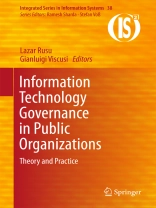This book examines trends and challenges in research on IT governance in public organizations, reporting innovative research and new insights in the theories, models and practices within the area. As we noticed, IT governance plays an important role in generating value from organization’s IT investments. However there are different challenges for researchers in studying IT governance in public organizations due to the differences between political, administrative, and practices in these organizations.
The first section of the book looks at Management issues, including an introduction to IT governance in public organizations; a systematic review of IT alignment research in public organizations; the role of middle managers in aligning strategy and IT in public service organizations; and an analysis of alignment and governance with regard to IT-related policy decisions.
The second section examines Modelling, including a consideration of the challenges faced by public administration; a discussion of a framework for IT governance implementation suitable to improve alignment and communication between stakeholders of IT services; the design and implementation of IT architecture; and the adoption of enterprise architecture in public organizations.
Finally, section three presents Case Studies, including IT governance in the context of e-government strategy implementation in the Caribbean; the relationship of IT organizational structure and IT governance performance in the IT department of a public research and education organization in a developing country; the relationship between organizational ambidexterity and IT governance through a study of the Swedish Tax Authorities; and the role of institutional logics in IT project activities and interactions in a large Swedish hospital.
Mục lục
Chapter 1. Discussing and Conceiving an Information and Technology Governance Model in Public Organizations.- Chapter 2. IT Alignment in Public Organizations: A Systematic Literature Review.- Chapter 3. A Perspective on the Roles of Middle Managers in Aligning Strategy and Information Technology in Public Service Organizations.- Chapter 4. Governing is in the Details.- Chapter 5. Towards Decentralized IT Governance in the Public Sector: A Capability-oriented Approach.- Chapter 6. IT Governance and its Implementation Based on a Detailed Framework of IT Governance (d Fog IT) in Public Enterprises.- Chapter 7. Business and IT Architecture for the Public Sector: Problems, IT Systems Alternatives and Selection Guidelines.- Chapter 8. Problems of Enterprise Architecture Adoption in the Public Sector: Root Causes and Some Solutions.- Chapter 9. IT Governance in E-Government Implementations in the Caribbean: Key Characteristics and Mechanisms.- Chapter 10. IT Organization Structure Relationship with IT Governance Performance: Case of a Public Organization.- Chapter 11. Ambidextrous IT Governance in the Public Sector: A Revelatory Case Study of the Swedish Tax Authorities.- Chapter 12. Conflicting Institutional Logics in Healthcare Organisations: Implications for IT Governance.
Giới thiệu về tác giả
Lazar Rusu is a Professor in the Department of Computer and Systems Sciences, Stockholm University, Sweden. His research interests are IT Governance, Business-IT Alignment, and IT Outsourcing, and he has professional experience of over 30 years both industrial and academic in the area of information systems/information technology. He has published his research work in journals such as Computers in Human Behavior, Industrial Management & Data Systems, Information Systems Management, Journal of Global Information Technology Management, Journal of Information Technology Theory and Applications, International Journal of Information Technology and Management, International Journal of IT/Business Alignment and Governance and The Electronic Journal of Information Systems in Developing Countries, among others. Moreover his research work has been published in the proceedings of top conferences in information systems including in Springer Lecture Notes in Computer Science series. He is author of a number of book chapters published by IGI Global and Springer, co-editor of the book Information Systems, E-Learning, and Knowledge Management Research, Communications in Computer and Information Science, vol. 278 published in 2012 by Springer, and also co-editor of the book entitled Modern Techniques for Successful IT Project Management, published in 2015 by IGI Global. He is associate editor of International Journal of IT/Business Alignment and Governance.
Gianluigi Viscusi is a Research Fellow at the Chair of Corporate Strategy and Innovation (CSI) of the EPFL. His research interests include information systems strategy and planning, business modeling, public policy and technology innovation, e-government, information quality and value, service management and engineering, and social study of information systems. He has been a consultant on e-government planning, policy design, and implementation roadmap for international organizations such as, e.g., the OECD. Currently, his research focuses on three main streams: crowd-driven innovation, social value of open government, and translational research in innovation and technology management. His research has been published in a range of books, conference proceedings, and journals such as, e.g., Government Information Quarterly. In 2010 he has co-authored with Carlo Batini and Massimo Mecella the book Information Systems for e Government: A Quality of Service Perspective (Springer, Heidelberg).












